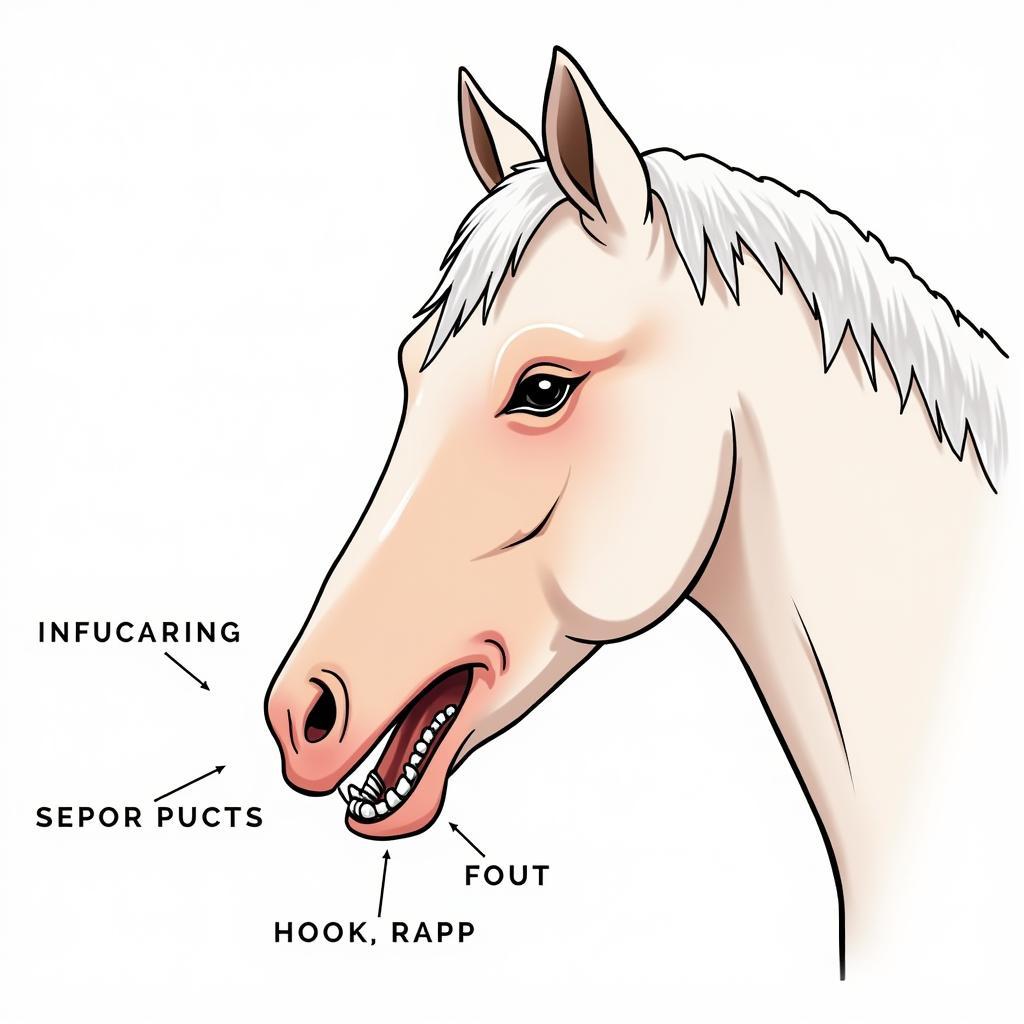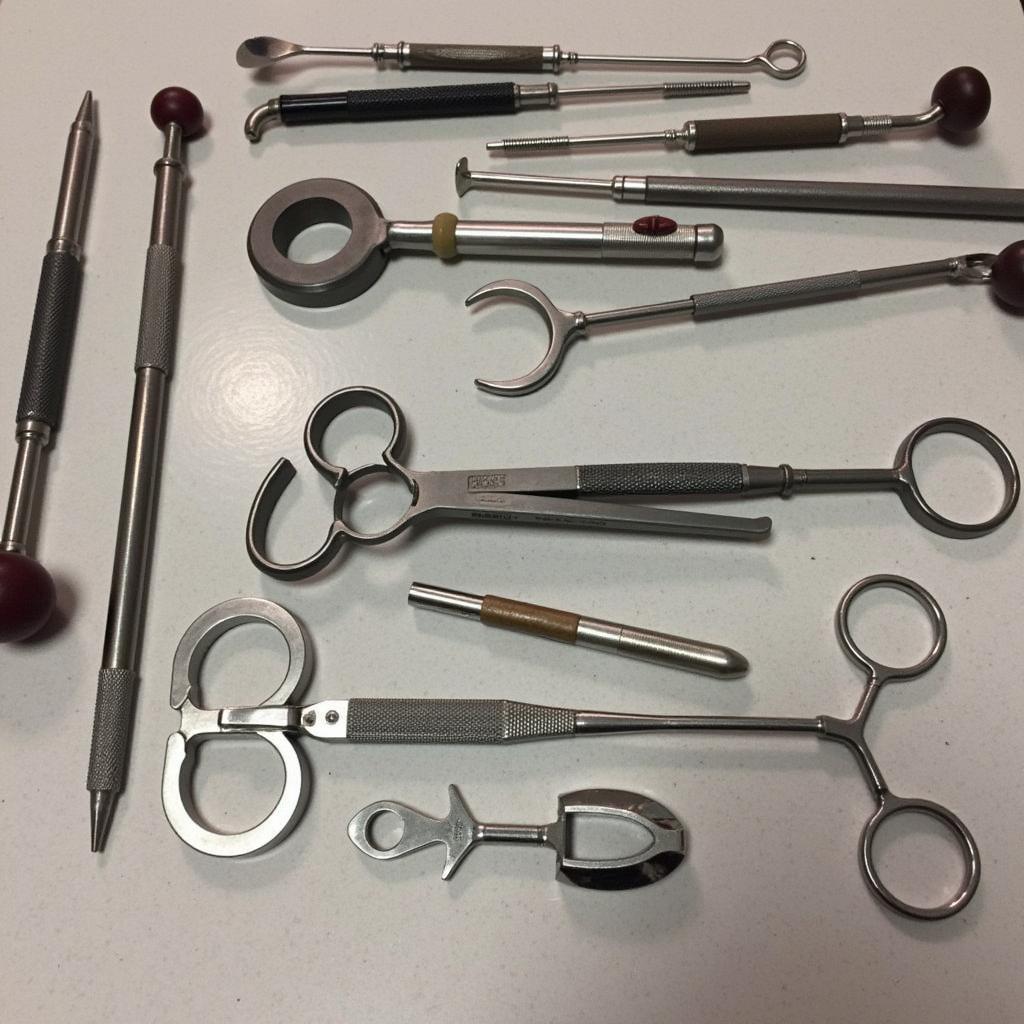Horse Teeth Float is a common dental procedure performed on horses to file down sharp points and edges on their teeth. These sharp points can develop due to the horse’s natural chewing motion and the continuous growth of their teeth. Left untreated, they can cause discomfort, difficulty eating, and even lead to more serious dental problems. Understanding this essential aspect of equine care is crucial for every horse owner.
Why is Horse Teeth Floating Necessary?
Horses’ teeth constantly grow throughout their lives. As they graze, their teeth grind against each other, creating sharp enamel points on the outside edges of the upper cheek teeth and the inside edges of the lower cheek teeth. These sharp points can irritate the cheeks and tongue, causing pain and ulcers. This can make chewing difficult, leading to weight loss, quidding (dropping partially chewed food), and poor performance. Regular horse teeth floating prevents these problems and ensures your horse can comfortably and efficiently process its food.
Horses with dental issues may exhibit various signs, including difficulty chewing, head tilting or shaking, excessive drooling, and weight loss. If you notice any of these symptoms, it’s crucial to consult with an equine veterinarian or a qualified equine dental technician.
After the first paragraph, I’d like to link to more information about teeth floating for horses. teeth floating horses
How Often Should a Horse’s Teeth Be Floated?
The frequency of horse teeth floating varies depending on the horse’s age, breed, and individual dental characteristics. Generally, most horses benefit from having their teeth floated annually. Younger horses, whose teeth are still developing, may require more frequent floating, sometimes every six months. Older horses may also need more frequent checkups due to increased wear and tear on their teeth.
The Horse Teeth Floating Procedure
Horse teeth floating is typically performed by an equine veterinarian or a qualified equine dental technician. The procedure usually involves sedating the horse to ensure its comfort and safety. A dental speculum is then used to keep the horse’s mouth open, allowing the practitioner to access the teeth. Specialized tools, called floats, are used to file down the sharp points and edges. The practitioner carefully examines each tooth to ensure proper alignment and remove any hooks or ramps that may have developed.
Potential Complications of Horse Teeth Floating
While horse teeth floating is generally a safe procedure, some potential complications can occur, such as accidental injury to the mouth or teeth. Choosing a qualified and experienced practitioner is essential to minimize these risks.
“Regular dental care, including floating, is an integral part of maintaining your horse’s overall health and well-being,” says Dr. Emily Carter, DVM, an equine veterinarian with over 20 years of experience.
 Horse Dental Anatomy and Common Problems
Horse Dental Anatomy and Common Problems
Recognizing the Signs of Dental Problems in Horses
Learning to recognize the signs of dental problems in your horse is vital. Common indicators include difficulty chewing, dropping food (quidding), head tossing, and resistance to the bit. Regularly checking your horse’s mouth for any abnormalities and scheduling annual dental exams can help prevent more serious issues from developing. Remember, early detection and treatment are key to maintaining your horse’s dental health. More information on dental issues can be found on our page about horse diastema. horse diastema
Caring for Your Horse’s Teeth After Floating
After having its teeth floated, your horse may experience some mild discomfort or sensitivity. Offer soft, easily chewable feed for a few days. Monitor your horse’s eating habits and contact your veterinarian if you notice any unusual behavior or signs of pain.
“Just like humans, horses need regular dental care to stay healthy and comfortable. Investing in preventative care can save you money and heartache in the long run,” adds Dr. Carter. A horse shedding blade can help keep your horse’s coat healthy, contributing to their overall well-being. horse shedding blade
 Horse Dental Care Tools and Equipment
Horse Dental Care Tools and Equipment
Horse Teeth Float: Keeping Your Equine Partner Healthy
Horse teeth float is a vital aspect of equine care, ensuring your horse’s comfort and overall well-being. Regular dental checkups and floating prevent painful dental problems and allow your horse to enjoy a healthy, active life. Understanding the importance of this procedure and recognizing the signs of dental issues are crucial for every horse owner. You can also find helpful information about horse dental speculums on our website. dental speculum horse And if you’re concerned about potential abscesses, you can view pictures of horse tooth abscesses here: horse tooth abscess pictures
FAQ
- What is the purpose of horse teeth floating? To remove sharp enamel points that can cause discomfort and interfere with chewing.
- How often should a horse’s teeth be floated? Typically, annually, but it depends on the individual horse.
- Who performs horse teeth floating? An equine veterinarian or a qualified equine dental technician.
- Is horse teeth floating painful? The procedure is usually performed under sedation to minimize discomfort.
- What are the signs of dental problems in horses? Difficulty chewing, quidding, head tossing, and resistance to the bit.
- What should I feed my horse after teeth floating? Soft, easily chewable feed.
- How can I find a qualified equine dental practitioner? Ask your veterinarian for a recommendation.
Common Scenarios and Questions
- My horse is dropping food while eating. Could this be a dental problem? Yes, quidding is a common sign of dental issues.
- My horse is resistant to the bit. Could this be related to his teeth? Yes, dental discomfort can cause bit resistance.
- How much does horse teeth floating cost? The cost varies depending on the practitioner and location.
Further Resources
For more information on related topics, you might find our articles on horse shedding blades and diastema helpful.
Contact Us
For any further assistance or inquiries, please contact us at Phone: 0772127271, Email: [email protected] Or visit us at: QGM2+WX2, Vị Trung, Vị Thuỷ, Hậu Giang, Việt Nam. Our customer support team is available 24/7.